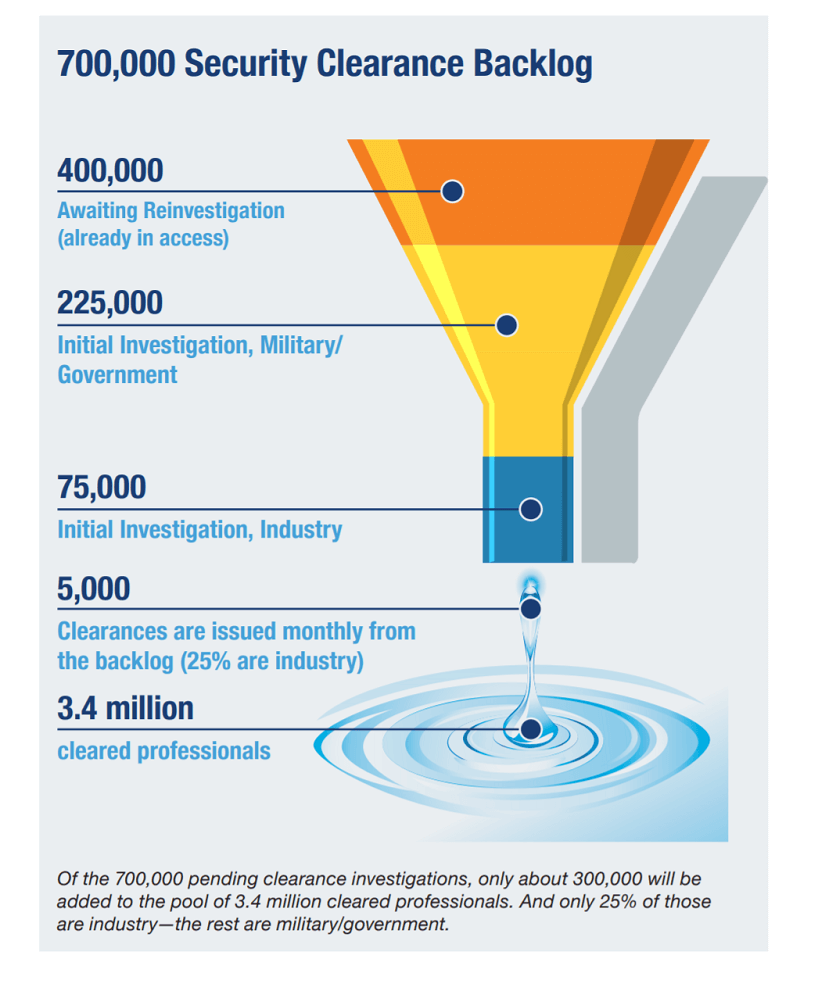After several years of relatively flat salaries, government shutdowns and salary freezes, salaries for security-cleared workers are beginning to heat up. According to the 2018 ClearanceJobs Compensation Survey results, total compensation for all surveyed security-cleared professionals is $93,004, up 7% since 2017.
“Today, we have a great need for professionals with the right skills and the right eligibility,” said Evan Lesser, founder and president of ClearanceJobs.com. “The end of sequestration and record growth in the Pentagon budget – along with the difficulty in issuing new clearances – has created incredibly high demand for cleared professionals, particularly those in specialized technical fields such as data science and IT engineering.”
The top five highest paid industries are Engineering with an average total compensation of $102,012 and IT with an average total compensation of $90,699. The highest paid jobs are Systems Engineer, with average total compensation of $122,386 and IT-Software with average total compensation of $121,026.
Defense Budgets Growing, Talent Pool Shrinking
Today’s increasing salary figures reflect the supply/demand trends of the cleared workforce. The government has reduced the number of DoD security clearances by more than 30 percent since 2013, from a high of 5.1 million to under 3.4 million. Security clearance processing times are also at record highs. It currently takes an average of 534 days to process a DoD Top Secret security clearance. With a 700,000+ investigation backlog this means only a slow trickle of new talent into an already shallow pool.
As the cleared workforce dwindles, defense industry recruiters also face a strengthening non-cleared commercial sector. In May the national unemployment rate reached 3.8% (Bureau of Labor Statistics), the lowest figure since December of 2000.
The number of individuals with a security clearance has remained relatively flat over the past year. Even if the backlog is addressed, until companies are able to process new security clearance investigations in a more timely fashion, the challenges with the cleared workforce will continue.
The defense industry is rebounding after the challenges of the Budget Control Act. Budgets are up, and so is hiring. The increase in defense industry jobs is certainly reflected on ClearanceJobs. The number of open positions on ClearanceJobs is up 243% since 2015, and up 50% year-over-year.
“It’s not just finding people with the appropriate pedigree and experience, it’s access and clearances,” noted michael Bruni, vice
President of Talent and Acquisition at KeyW. “Your talent pool becomes much less of a pool. literally in some cases you can count
on your hand the people with that skill, and that access.”
And defense recruiters are left competing for professionals with skills in data science and cyber – knowing their time to hire may linger to up to two years for an uncleared candidate. This creates a critical talent management issue, emphasized in Senate testimony on security clearance reform initiatives.
” Given the challenges we face in finding qualified, cleared talent, to meet the mission that we have, we consider it a national security issue, and a government issue. Top professionals are in high demand across the nation. They do not have to wait more
than a year to get a job,” testified Jane Chappell, Vice President of Global Intelligence Solutions (GIS), Raytheon, at a hearing of the Senate Intelligence Committee.
Last month the Senate Intelligence Committee unanimously voted in favor of legislation seeking to improve the security clearance process and improve cybersecurity. The Intelligence Authorization Act includes these provisions:
- Reducing the background investigation backlog to 200,000 by the end of 2019.
- Consolidating the background investigation function between the National Background Investigation Bureau (NBIB) and the DoD.
- Requiring Director of National Intelligence (DNI) to
- Reexamine the SF-86 questionnaire and the adjudicative standards,
- Expand innovative techniques for investigative interviews (like Skype interviews),
- Employ continuous evaluation instead of periodic reinvestigations,
- Maintain consistent policies on interim clearances and treatment between government and contract employees, and
- Make use of automated records checks from previous employers.
The bullets in red are the most significant – they are the functions that could help to actually increase the flow through that supply funnel, allowing investigations to process more swiftly, and for candidates to move from the commercial sector into national security work without a one-to-two year wait.
The legislation is still pending, and even if implemented, it will still take time to incorporate the initiatives that will create process improvement.
Employee Retention Grows More Important in a Tight Candidate Market
Competition is increasing the premium paid for experience, as well. The demographic earning the highest increases are those with ten years of experience or more. Senior-level career professionals saw a 10% increase compared to 2017, and management-level professionals saw a 9% increase. That may reflect a desire by employers to retain – and pay a premium – to keep their higher-level employees, particularly in a tight applicant market where experience is not easily replaced.





